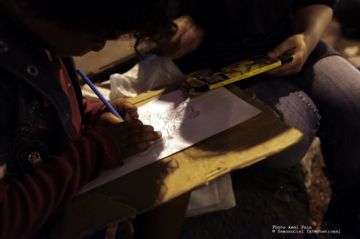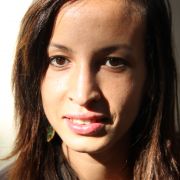Where did the idea of organizing a children camp come from?
The idea was born when I took office in Egypt in early May. I had a discussion with each of the professionals working for Samusocial International Egypte in order to collect new ideas of actions. That’s when Sherif Abdel Fatah, our social coordinator shared his dream : “to take on a weekend trip the children we meet every day in the streets, at least once a year in a camp, where we could supplement the emergency work we do in the streets by spending more quality time with them”. However, we considered at that time that the project could not be straightaway achievable, as it is no part of our main activities. We then met a donor called Alexbank, who often works with child protection organizations and was very much interested by the idea of financing the camp. So it’s thanks to Alexbank that the project of the camp became a reality.
What were the objectives of organizing such camp? How did it go?
The idea consisted in giving the opportunity to children between 8 and 15 years old to spend 2 days in a camp called Fagnoon Art School, where they could do some artistic activities. We also wanted to take advantage of these 2 days spent in the camp to have a psychologist work with the children on the risks they’re facing in everyday life and how to protect themselves from these dangers. The original idea evolved, following the suggestion of Alexbank to also include Hope Village, an NGO which has shelter, in the project. So it was about mixing children living in the streets and children living in shelters and share discussions about their way of life so that in the end the children living in the streets would have a better opinion on shelters and maybe gradually consider joining one. But this project was also about giving the opportunity to young people, exhausted by street like, to sleep in a safe place for a couple of days, to have balanced meals and to be supported by professionals working with them, such as social workers, psychologists, doctors, social and educational activities facilitators… But without any obligation to stay for more than two days, which is what often scares them when you offer them to live in a shelter.
 The idea was also that the children could discover their talents by offering them the opportunity to experiment many manual activities.
The idea was also that the children could discover their talents by offering them the opportunity to experiment many manual activities.
We wanted the children to end up with a project at the end of the camp. And by project, we don’t mean a long term and ambitious project such as to leave the street. One project could simply mean : “I understood the importance of hygiene, and I will be more careful about washing my hands more often”; which is a huge step for a child living in the street, to realize the need to take care of themselves, it means they actually exist and are worth something. We wanted to “sow seeds”: even though we knew that 2 days spent with the children were not sufficient to get them out of the street, we were sure that something would wriggle the way into their brains. In this camp, we could add something different from what we do on an everyday basis, and now this work is to be continued in our street -based work. Even if most of the work is done through street-based work, this alternative pace and place enabled us to complement and deepen our work.
Furthermore, this camp was built with the children, with this principle of “reaching out to the children” and “building together”. When we knew our donor Alexbank would finance the camp, we went to see the children of one neighborhood –to avoid inter-band rivalries. We talked to them about this project of camp, asking them where they would want to go, what activities they would want to do and we built the program accordingly.
Altogether 20 children participated in the camp, 10 girls and 10 boys. The strong point of this camp was about mixing boys and girls, who are usually very rarely together.
We very quickly felt that we were like a family, there was a real mix between boys and girls, and between children of the 2 organizations. It was neither a holiday nor a playing camp, this camp responded to clearly set up goals. We noticed a great involvement of the children: they respected the rules even if it was a pretty tough exercise for them. I would like to praise the work of the professionals, that succeeded in getting the children to abide by to rules which they don’t respect in their everyday life.
This camp was a first pilot experience; we had never organized this kind of event so we first wanted to take few children to this camp and ensure the support of numerous professionals (there were 14 adults), before considering renewing this opportunity in the future, one that would last longer and with more children participating as our donor wished.
What have the children learnt from this experience?
First of all, they have been re-familiarized with a different way of life than street life, on both pleasant and unpleasant aspects. On the one hand, they enjoyed good and large meals , chose their activities and played with their friends, surrounded by professional staff. But on the other hand, they had to respect the scheduled program, they also had to listen to the others while they were talking and had to ask for their turn to speak when they were in groups.
During the camp, we also had the opportunity to discuss specific issues. As such, we organized two awareness group discussions on sexual abuse : one about sexual abuse in the street and the other one about life in the streets and life in shelters, both led by the psychologist. The presence of the psychologist was really a positive aspect of this camp. The children in need of psychological support could see him whenever they wanted to. This convinced us even more that a psychologist is really crucial in individualized work with street children . Furthermore, the children now have a greater confidence in the professional workers, they feel even closer to them.
Was there any spare time or were all the activities supervised ?
The team supervised all the activities but the children were always offered many options: they could choose between 6 different activities. The children had also the choice to have an individual psychological support whenever they wanted.
For you, what have been the most striking events of this camp ?
What stroke me the most was this feeling of being together, especially when we would sing the slogan: “All together like in one single hand, we will draw our dreams together from Fagnoon”.
We also had the impression that with some time, it’s possible to fight against stereotypes, and especially about sexual abuse. Worldwide, you will often hear people thinking that women have a responsibility when they are sexually abused. During a discussion group with girls and boys, a boy was saying it was the girls’ faults if they were sexually abused. But he changed his mind at the end of the discussion after hearing some boys telling they had also been sexually abused. For them as well as for us, it’s a great result.
What are the more global impacts of the camp? Are you considering renewing the experience ?
The camp took place a few weeks ago, so it’s a bit too early to conclude about the lasting impacts. To me, many positive results have been achieved. It’s a great pilot experience, and we could potentially renew the experience next September . I am waiting for the children’s assessment, the professionals also took down some notes during the weekend, that will help write the report . I will analyze both the notes of the children and those of the professionals before concluding about the lasting impacts, even if I already consider it to have been a wonderful experience !
 Nawel Laglaoui was in Paris end of june for our annual days of coordination. She has been the country representative of Samusocial International in Egypt for the last three months. Before working here, she worked one year at the French embassy in Egypt and before that, she worked for 4 years at the Regional Council of Midi-Pyrénées with the vice presidents in charge of Sustainable development, solidarity and decentralized cooperation. Furthermore, she has always been committed to the cause of solidarity, childhood and especially popular education. This job represents thus an accomplishment of many things: first of all her desire to work with children and youth, and secondly to contribute to the building of a new Egyptian society.
Nawel Laglaoui was in Paris end of june for our annual days of coordination. She has been the country representative of Samusocial International in Egypt for the last three months. Before working here, she worked one year at the French embassy in Egypt and before that, she worked for 4 years at the Regional Council of Midi-Pyrénées with the vice presidents in charge of Sustainable development, solidarity and decentralized cooperation. Furthermore, she has always been committed to the cause of solidarity, childhood and especially popular education. This job represents thus an accomplishment of many things: first of all her desire to work with children and youth, and secondly to contribute to the building of a new Egyptian society.
